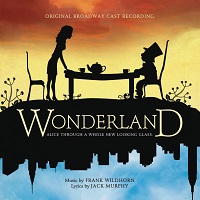 Original Broadway Cast, 2011 (Masterworks Broadway)
Original Broadway Cast, 2011 (Masterworks Broadway)  (3 / 5) If you’re looking for an under-the-radar guilty pleasure album, you could do worse than Wonderland. It’s the silliest and least self-important of Frank Wildhorn’s scores, and the first act especially is a wacky delight. “We’re all a little nuts, in case you didn’t know,” the denizens of Wonderland tell an all-grown-up Alice (Janet Dacal) in this unconvincing twist on Lewis Carroll (please don’t listen for the plot), and the music is a little nuts, too. The Wonderland setting and the panoply of fantasy characters allow Wildhorn to pastiche any style he can think of: there’s a soulful caterpillar (E. Clayton Cornelious), a pop salsa-dancing Cheshire Cat called El Gato (Jose Llana), and a boy band-fronting White Knight (Darren Ritchie). Their trio of songs, which come back-to-back-to-back early on the album, are well-made, playful, and fun. Dacal, whose Alice communicates exclusively through a pop belt dialed up to 11, is always an appealing vocal presence, especially in the aggressively catchy “Through the Looking Glass.” They’re all overshadowed, though, by the extraordinary Kate Shindle (before her election to the presidency of Actors’ Equity) as an electrifyingly villainous Mad Hatter who screlts to bring the chandelier down. The versatile orchestrations, by Wildhorn’s frequent collaborator Kim Scharnberg, are a hoot. Alas, the second act is an unoriginal slog until the finale, “Finding Wonderland,” which recalls The Wiz’s “Home” (as opposed to this show’s sweet opening number, also called “Home”) and showcases Dacal’s substantial gifts. — Dan Rubins
(3 / 5) If you’re looking for an under-the-radar guilty pleasure album, you could do worse than Wonderland. It’s the silliest and least self-important of Frank Wildhorn’s scores, and the first act especially is a wacky delight. “We’re all a little nuts, in case you didn’t know,” the denizens of Wonderland tell an all-grown-up Alice (Janet Dacal) in this unconvincing twist on Lewis Carroll (please don’t listen for the plot), and the music is a little nuts, too. The Wonderland setting and the panoply of fantasy characters allow Wildhorn to pastiche any style he can think of: there’s a soulful caterpillar (E. Clayton Cornelious), a pop salsa-dancing Cheshire Cat called El Gato (Jose Llana), and a boy band-fronting White Knight (Darren Ritchie). Their trio of songs, which come back-to-back-to-back early on the album, are well-made, playful, and fun. Dacal, whose Alice communicates exclusively through a pop belt dialed up to 11, is always an appealing vocal presence, especially in the aggressively catchy “Through the Looking Glass.” They’re all overshadowed, though, by the extraordinary Kate Shindle (before her election to the presidency of Actors’ Equity) as an electrifyingly villainous Mad Hatter who screlts to bring the chandelier down. The versatile orchestrations, by Wildhorn’s frequent collaborator Kim Scharnberg, are a hoot. Alas, the second act is an unoriginal slog until the finale, “Finding Wonderland,” which recalls The Wiz’s “Home” (as opposed to this show’s sweet opening number, also called “Home”) and showcases Dacal’s substantial gifts. — Dan Rubins
Category Archives: W-Z
Willy Wonka and the Chocolate Factory
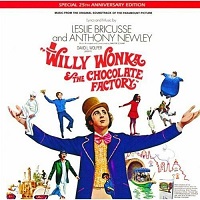 Film Soundtrack, 1971 (Geffen)
Film Soundtrack, 1971 (Geffen)  (3 / 5) This slim film soundtrack — featuring six full songs by Leslie Bricusse and Anthony Newley, plus some reprises and several lovely instrumentals also credited to the pair — grounds itself in the film’s most sensational song, “Pure Imagination.” As Wonka, Gene Wilder delivers that song with leisurely grace, but the album’s richest tracks, “The Wondrous Boat Ride” and “Wonkavator/End Title,” offer the melody in a few different iterations with orchestral majesty. (Walter Scharf was the film’s music arranger and conductor.) Among the other highlights to be found here are an endearing rendition of “Cheer Up, Charlie” by Diana Lee, dubbing for Diana Sowle in the role of Charlie’s mother, and the amazingly demonic Julie Dawn Cole as Veruca Salt tearing her way through “I Want It Now.” “The Candy Man” is a too-treacly classic, but the goofy, oft-reprised “Oompa Loompa” theme earns its iconic status. Several underscored spoken dialogue scenes are included on the album as a reminder of some of the film’s less-celebrated performances. [Ed. Note: For reviews of the two cast recordings of the stage musical inspired by this film and its source material, Charlie and the Chocolate Factory, see the separate entry under that title.] — Dan Rubins
(3 / 5) This slim film soundtrack — featuring six full songs by Leslie Bricusse and Anthony Newley, plus some reprises and several lovely instrumentals also credited to the pair — grounds itself in the film’s most sensational song, “Pure Imagination.” As Wonka, Gene Wilder delivers that song with leisurely grace, but the album’s richest tracks, “The Wondrous Boat Ride” and “Wonkavator/End Title,” offer the melody in a few different iterations with orchestral majesty. (Walter Scharf was the film’s music arranger and conductor.) Among the other highlights to be found here are an endearing rendition of “Cheer Up, Charlie” by Diana Lee, dubbing for Diana Sowle in the role of Charlie’s mother, and the amazingly demonic Julie Dawn Cole as Veruca Salt tearing her way through “I Want It Now.” “The Candy Man” is a too-treacly classic, but the goofy, oft-reprised “Oompa Loompa” theme earns its iconic status. Several underscored spoken dialogue scenes are included on the album as a reminder of some of the film’s less-celebrated performances. [Ed. Note: For reviews of the two cast recordings of the stage musical inspired by this film and its source material, Charlie and the Chocolate Factory, see the separate entry under that title.] — Dan RubinsWar Paint
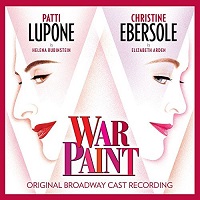 Original Broadway Cast, 2017 (Ghostlight)
Original Broadway Cast, 2017 (Ghostlight)  (2 / 5) Based on the real-life rivalry between cosmetics titans Helena Rubinstein and Elizabeth Arden, with a score by Grey Gardens team Michael Korie and Scott Frankel, War Paint had the potential to be a great musical. Or, at least, with Broadway titans Patti LuPone and Christine Ebersole inhabiting the lead roles, it could have been a highly entertaining one. So it’s unfortunate that the final product played so tepidly on stage. While LuPone (Rubinstein) and Ebersole (Arden) were each in top form, the show never had its leading ladies share a scene together until the very end; instead, they would sing about each other rather than to each other from opposite sides of the stage. This robbed the show of any tension or drama, and it became a “she said/she said” play-by-play of the two women’s lives. On this recording, War Paint fares slightly better, with the stars giving commanding vocal performances, but the album also reinforces that the score is not on par with Grey Gardens. Though Frankel’s jazzy compositions are inventive and tuneful in period-appropriate orchestrations by Bruce Coughlin, several of the songs lack structure and/or don’t build to a satisfying musical conclusion. Korie’s lyrics, meanwhile, are lacking in subtlety or any deep insight regarding the principal characters, making such songs as “If I’d Been a Man” and “My Secret Weapon” much less effective than they might have been. Still, there are two strong 11 o’clock numbers in “Forever Beautiful” (Rubinstein) and “Pink” (Arden), each a reflection on the women’s legacies, which are now being taken away from them in the concluding years of their lives. When the two do get to sing together, as they do in “Face to Face” and “Beauty in the World,” LuPone and Ebersole’s voices blend in a surprisingly effective cohesion that briefly brings the score to a more musically dramatic plain. Douglas Sills and John Dossett also appear as the two men behind the women, but their talents are wasted on the two worst songs in the score, “Step on Out” and “Dinosaurs.” In War Paint, it’s clear that LuPone and Ebersole are meant to be the ones who rule — and they do. But with stronger material, they could’ve really shone. — Matt Koplik
(2 / 5) Based on the real-life rivalry between cosmetics titans Helena Rubinstein and Elizabeth Arden, with a score by Grey Gardens team Michael Korie and Scott Frankel, War Paint had the potential to be a great musical. Or, at least, with Broadway titans Patti LuPone and Christine Ebersole inhabiting the lead roles, it could have been a highly entertaining one. So it’s unfortunate that the final product played so tepidly on stage. While LuPone (Rubinstein) and Ebersole (Arden) were each in top form, the show never had its leading ladies share a scene together until the very end; instead, they would sing about each other rather than to each other from opposite sides of the stage. This robbed the show of any tension or drama, and it became a “she said/she said” play-by-play of the two women’s lives. On this recording, War Paint fares slightly better, with the stars giving commanding vocal performances, but the album also reinforces that the score is not on par with Grey Gardens. Though Frankel’s jazzy compositions are inventive and tuneful in period-appropriate orchestrations by Bruce Coughlin, several of the songs lack structure and/or don’t build to a satisfying musical conclusion. Korie’s lyrics, meanwhile, are lacking in subtlety or any deep insight regarding the principal characters, making such songs as “If I’d Been a Man” and “My Secret Weapon” much less effective than they might have been. Still, there are two strong 11 o’clock numbers in “Forever Beautiful” (Rubinstein) and “Pink” (Arden), each a reflection on the women’s legacies, which are now being taken away from them in the concluding years of their lives. When the two do get to sing together, as they do in “Face to Face” and “Beauty in the World,” LuPone and Ebersole’s voices blend in a surprisingly effective cohesion that briefly brings the score to a more musically dramatic plain. Douglas Sills and John Dossett also appear as the two men behind the women, but their talents are wasted on the two worst songs in the score, “Step on Out” and “Dinosaurs.” In War Paint, it’s clear that LuPone and Ebersole are meant to be the ones who rule — and they do. But with stronger material, they could’ve really shone. — Matt Koplik
Waitress
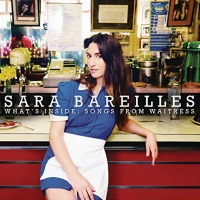 Sara Bareilles: What’s Inside: Songs from Waitress, 2015 (Epic)
Sara Bareilles: What’s Inside: Songs from Waitress, 2015 (Epic)  (4 / 5) The idea of Sara Bareilles writing a musical wasn’t so far-out, even before it happened. The 21st century has seen several musical theater scores written by popular singer/songwriters (Kinky Boots, The Last Ship, 9 to 5), and with her insightful lyrics and inventive, pop/soul colored music, Bareilles seemed a natural fit for the modern musical stage. But, gifted as many of these writers are, few have been able to successfully translate their talent to Broadway, so it’s refreshing that Bareilles has done as well as she has in this respect. What’s Inside is not a cast recording, but more of a concept album that previews Bareilles’ score for Waitress — a musical based on the 2007 film of the same title, about a diner waitress and pie maker extraordinaire named Jenna who’s trying to escape an unhappy marriage, only to discover that she’s pregnant. Though the plot is a bit of a downer, the film used dry humor and charming performances to create more of a grounded, intimate comedy. Bareilles’ songs match the tone of the film and dig deep into the characters, from the deceptively peppy “Opening Up” to the ethereal, dreamlike “Soft Place to Land” to the heartbreaking “She Used to Be Mine.” All of the tracks on this album are sung by Bareilles (with guest vocals by Jason Mraz), and it’s charming to hear her shift from Jenna to other characters throughout. What’s Inside: Songs from Waitress is both a fun showcase for her as a singer/songwriter and a great introduction to her first musical. — Matt Koplik
(4 / 5) The idea of Sara Bareilles writing a musical wasn’t so far-out, even before it happened. The 21st century has seen several musical theater scores written by popular singer/songwriters (Kinky Boots, The Last Ship, 9 to 5), and with her insightful lyrics and inventive, pop/soul colored music, Bareilles seemed a natural fit for the modern musical stage. But, gifted as many of these writers are, few have been able to successfully translate their talent to Broadway, so it’s refreshing that Bareilles has done as well as she has in this respect. What’s Inside is not a cast recording, but more of a concept album that previews Bareilles’ score for Waitress — a musical based on the 2007 film of the same title, about a diner waitress and pie maker extraordinaire named Jenna who’s trying to escape an unhappy marriage, only to discover that she’s pregnant. Though the plot is a bit of a downer, the film used dry humor and charming performances to create more of a grounded, intimate comedy. Bareilles’ songs match the tone of the film and dig deep into the characters, from the deceptively peppy “Opening Up” to the ethereal, dreamlike “Soft Place to Land” to the heartbreaking “She Used to Be Mine.” All of the tracks on this album are sung by Bareilles (with guest vocals by Jason Mraz), and it’s charming to hear her shift from Jenna to other characters throughout. What’s Inside: Songs from Waitress is both a fun showcase for her as a singer/songwriter and a great introduction to her first musical. — Matt Koplik
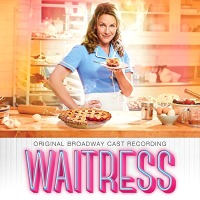 Original Broadway Cast, 2016 (DMI Soundtracks)
Original Broadway Cast, 2016 (DMI Soundtracks)  (3 / 5) This recording preserves the score for Waitress as presented on Broadway, with a fair amount of dialogue included on the album, vocal arrangements beefed up, and seven new songs added (“Door Number Three” has been revised to become “What Baking Can Do”). It all feels a little overstuffed. Part of what made Waitress work so well on screen were the grounded performances and the simple, almost quaint way in which the film presented itself as a story of everyday people dealing with everyday situations. By comparison, the Broadway production and this recording are much broader and flashier, and the material suffers because of it; many songs are overwhelmed by the arrangements or lose their emotional potency due to performances that lean more towards caricature than humanity. Also, some of the additional songs — for example “It Only Takes a Taste” and “I Love You Like a Table” — are not as strong as those Bareilles first presented on the concept album. On a positive note, the cast is made up of stellar singers. They bring to the score a Broadway shine that makes the album easily listenable, even if it’s not the best style for the piece. The best thing about the recording is Jessie Mueller in the central role of Jenna. Her voice is essentially as sweet and smooth as Bareilles’, yet versatile enough to delve deep into dark emotional territory and bring aching power to “She Used to Be Mine.” In addition, Mueller is a smart actress who offers the most realistic performance to be heard here. Every time she’s front and center, she wipes away the glossiness that coats the rest of the album, and she brings back the score’s heartbeat. — M.K.
(3 / 5) This recording preserves the score for Waitress as presented on Broadway, with a fair amount of dialogue included on the album, vocal arrangements beefed up, and seven new songs added (“Door Number Three” has been revised to become “What Baking Can Do”). It all feels a little overstuffed. Part of what made Waitress work so well on screen were the grounded performances and the simple, almost quaint way in which the film presented itself as a story of everyday people dealing with everyday situations. By comparison, the Broadway production and this recording are much broader and flashier, and the material suffers because of it; many songs are overwhelmed by the arrangements or lose their emotional potency due to performances that lean more towards caricature than humanity. Also, some of the additional songs — for example “It Only Takes a Taste” and “I Love You Like a Table” — are not as strong as those Bareilles first presented on the concept album. On a positive note, the cast is made up of stellar singers. They bring to the score a Broadway shine that makes the album easily listenable, even if it’s not the best style for the piece. The best thing about the recording is Jessie Mueller in the central role of Jenna. Her voice is essentially as sweet and smooth as Bareilles’, yet versatile enough to delve deep into dark emotional territory and bring aching power to “She Used to Be Mine.” In addition, Mueller is a smart actress who offers the most realistic performance to be heard here. Every time she’s front and center, she wipes away the glossiness that coats the rest of the album, and she brings back the score’s heartbeat. — M.K.
Yank!
 Original Off-Broadway Cast, 2014 (PS Classics)
Original Off-Broadway Cast, 2014 (PS Classics)  (4 / 5) Musical theater fans look back with affection at the Off-Broadway shows of the early- to mid-sixties — small, unique productions whose distinctive scores guaranteed them long life on record, if not on the boards. (The Fantasticks, of course, is a major exception in the length-of-run tally.) Today, there are still examples of terrific, innovative musicals getting their start Off-Broadway or Off-Off-Broadway, and thankfully, many of them are being recorded. In the case of Yank!, a Kickstarter campaign helped raise funds to preserve the performances of nearly the entire company of the show’s 2010 York Theatre production. (Two of the cast members had scheduling conflicts.) Yank! is the creation of brothers David Zellnick (book and lyrics) and Joseph Zellnick (music), a wholly original work inspired by the precarious situation of gays and lesbians who had to remain closeted while serving in the armed forces during World War II. It centers on Stu (the amazing Bobby Steggart) and his love for Mitch (Ivan Hernandez), yet somehow the Zellnicks convey that their story reflects that of the thousands of others like them who served with honor. The storytelling is tight and focused, making good use of Stu’s wartime journal, discovered at the start of the show by a young man in the present day (also played by Steggart). This device offers a link between our time and the past while also allowing us to hear Stu’s private thoughts. The clever title number introduces the squad — the expected melting pot of ethnicities — and lets us see and hear Stu’s reaction to each of his comrades. The music effectively recreates the 1940s sound, especially in the diegetic numbers presented as songs heard on the radio; the fact that the legendary Jonathan Tunick was enlisted to rework the show’s original orchestrations for this recording doesn’t hurt. Nancy Anderson, the sole woman in the cast, is a musical chameleon. She plays four different vocalists, each with her own nuanced style, as well as Louise, a blunt lesbian secretary interviewed by Stu for Yank magazine. Jeffry Denman shines in the standout “Click,” reassuring Stu that “there are more of us than you imagined” and demonstrating (in dance) the signals and codes of gay social relations. The guys in Charlie Company are red-blooded American males; they indulge in lots of bullying and pranks, and they’re constantly thinking and talking about women, as in an ode to pin-up girls, “Betty.” But, in the end, the story is Stu’s, and Steggart owns the role. The quaver in his voice reveals Stu’s terror during basic training, his need to fit in, and his concerns about his sexuality. His longing for Mitch is natural and convincing; “Just True,” in which the two men dream of a future together, may well reduce the listener to tears. The album concludes movingly with Steggart, again as the young man who found the journal, pondering Stu’s fate, followed by a brief reprise of the key ballad, “Rememb’ring You.” — Laura Frankos
(4 / 5) Musical theater fans look back with affection at the Off-Broadway shows of the early- to mid-sixties — small, unique productions whose distinctive scores guaranteed them long life on record, if not on the boards. (The Fantasticks, of course, is a major exception in the length-of-run tally.) Today, there are still examples of terrific, innovative musicals getting their start Off-Broadway or Off-Off-Broadway, and thankfully, many of them are being recorded. In the case of Yank!, a Kickstarter campaign helped raise funds to preserve the performances of nearly the entire company of the show’s 2010 York Theatre production. (Two of the cast members had scheduling conflicts.) Yank! is the creation of brothers David Zellnick (book and lyrics) and Joseph Zellnick (music), a wholly original work inspired by the precarious situation of gays and lesbians who had to remain closeted while serving in the armed forces during World War II. It centers on Stu (the amazing Bobby Steggart) and his love for Mitch (Ivan Hernandez), yet somehow the Zellnicks convey that their story reflects that of the thousands of others like them who served with honor. The storytelling is tight and focused, making good use of Stu’s wartime journal, discovered at the start of the show by a young man in the present day (also played by Steggart). This device offers a link between our time and the past while also allowing us to hear Stu’s private thoughts. The clever title number introduces the squad — the expected melting pot of ethnicities — and lets us see and hear Stu’s reaction to each of his comrades. The music effectively recreates the 1940s sound, especially in the diegetic numbers presented as songs heard on the radio; the fact that the legendary Jonathan Tunick was enlisted to rework the show’s original orchestrations for this recording doesn’t hurt. Nancy Anderson, the sole woman in the cast, is a musical chameleon. She plays four different vocalists, each with her own nuanced style, as well as Louise, a blunt lesbian secretary interviewed by Stu for Yank magazine. Jeffry Denman shines in the standout “Click,” reassuring Stu that “there are more of us than you imagined” and demonstrating (in dance) the signals and codes of gay social relations. The guys in Charlie Company are red-blooded American males; they indulge in lots of bullying and pranks, and they’re constantly thinking and talking about women, as in an ode to pin-up girls, “Betty.” But, in the end, the story is Stu’s, and Steggart owns the role. The quaver in his voice reveals Stu’s terror during basic training, his need to fit in, and his concerns about his sexuality. His longing for Mitch is natural and convincing; “Just True,” in which the two men dream of a future together, may well reduce the listener to tears. The album concludes movingly with Steggart, again as the young man who found the journal, pondering Stu’s fate, followed by a brief reprise of the key ballad, “Rememb’ring You.” — Laura Frankos
The Wedding Singer
 Original Broadway Cast, 2006 (Masterworks Broadway)
Original Broadway Cast, 2006 (Masterworks Broadway)  (4 / 5) Antipathy towards screen-to-stage adaptations influenced a great many reactions to this tuner that musicalized the 1998 Adam Sandler movie for Broadway. It’s a pity, really, because the score by Matthew Sklar (music) and Chad Beguelin (lyrics) is one of the most charming and tuneful of the past 15 years or so. It helps that the songs are delivered by such theater vets as Laura Benanti, Amy Spanger, Rita Gardner, and Felicia Finley — along with comedian Stephen Lynch, who, in his Broadway debut, thoroughly charmed as the title character, a guy who’s dumped by his fianceé (Finley) on the eve of their own nuptials. Naturally, he loses his taste for performing at other people’s wedding receptions, and it’s only with the help of a good friend (Benanti) that he gets back on his feet and discovers genuine romance — wth her, of course. Because the show is set in the mid-1980s, composer Sklar pays homage to the pop icons of the day in his melodies, and his work, combined with the inventive and sometimes ingenious orchestrations of Irwin Fisch, calls to mind tunes by the likes of Madonna, Billy Joel, the Go-Gos, Stevie Nicks, and Michael Jackson. Beguelin’s lyrics match the styles of songs from the era, and they also brim with a kind of colloquial wit. Not everything in The Wedding Singer is great; the biggest stumble is “Move That Thang,” a rap number for Gardner, The Fantasticks’ original Luisa. But much of the score is golden. — Andy Propst
(4 / 5) Antipathy towards screen-to-stage adaptations influenced a great many reactions to this tuner that musicalized the 1998 Adam Sandler movie for Broadway. It’s a pity, really, because the score by Matthew Sklar (music) and Chad Beguelin (lyrics) is one of the most charming and tuneful of the past 15 years or so. It helps that the songs are delivered by such theater vets as Laura Benanti, Amy Spanger, Rita Gardner, and Felicia Finley — along with comedian Stephen Lynch, who, in his Broadway debut, thoroughly charmed as the title character, a guy who’s dumped by his fianceé (Finley) on the eve of their own nuptials. Naturally, he loses his taste for performing at other people’s wedding receptions, and it’s only with the help of a good friend (Benanti) that he gets back on his feet and discovers genuine romance — wth her, of course. Because the show is set in the mid-1980s, composer Sklar pays homage to the pop icons of the day in his melodies, and his work, combined with the inventive and sometimes ingenious orchestrations of Irwin Fisch, calls to mind tunes by the likes of Madonna, Billy Joel, the Go-Gos, Stevie Nicks, and Michael Jackson. Beguelin’s lyrics match the styles of songs from the era, and they also brim with a kind of colloquial wit. Not everything in The Wedding Singer is great; the biggest stumble is “Move That Thang,” a rap number for Gardner, The Fantasticks’ original Luisa. But much of the score is golden. — Andy Propst
Women on the Verge of a Nervous Breakdown
 Original Broadway Cast, 2011 (Ghostlight)
Original Broadway Cast, 2011 (Ghostlight)  (3 / 5) With its all-star cast and creative team, and a hilarious movie by Pedro Almodóvar as its source material, Women on the Verge of a Nervous Breakdown seemed poised to dominate the 2010-2011 Broadway season. Sadly, due to overly busy staging and a book inconsistent in tone, the show was a disappointment that ran for less than two months. But this crisp recording makes clear that it had a strong score overall, incredibly well sung by said all-star cast. Composer/lyricist David Yazbek (The Full Monty, Dirty Rotten Scoundrels) does some of his best work here; his melodies capture the essence of a vivacious Barcelona, and they’re enhanced by Simon Hale’s flavorful orchestrations. The lyrics are by turns witty and fun (“On the Verge”) or achingly lovely (“Shoes from Heaven”). Even with such passion and talent involved, however, the recording gives some indication of why the show didn’t work. Sherie Rene Scott is miscast as Pepa, an actress jilted by her lover via a message left on an answering machine. Although she’s in great voice, she doesn’t quite capture the proper spirit of zaniness, and she does better with ballads like “Mother’s Day” than with zesty pieces like “Lovesick.” In addition, both Danny Burstein and Brian Stokes Mitchell as (respectively) a taxi driver/narrator and Pepa’s exiting lover, Ivan, are criminally underused, with Mitchell given the weakest material in the score. Still, the highs outweigh the lows. As Pepa’s best friend, Candela, Laura Benanti shows her comedic brilliance in “Model Behavior.” It’s a tour de force number that chronicles the character’s constantly dramatic life via a series of voice messages, and Benanti handles Yazbek’s tongue twisting lyrics with ease. Patti LuPone is excellent as Lucia, Ivan’s unstable ex wife, and Yazbek gives her his best ballad to date with “Invisible,” Lucia’s plea for her sanity in a world that won’t let her move on. Though imperfect, Women on the Verge is an impressive work with a score that allows some of the modern musical theater’s finest performers several chances to shine. — Matt Koplik
(3 / 5) With its all-star cast and creative team, and a hilarious movie by Pedro Almodóvar as its source material, Women on the Verge of a Nervous Breakdown seemed poised to dominate the 2010-2011 Broadway season. Sadly, due to overly busy staging and a book inconsistent in tone, the show was a disappointment that ran for less than two months. But this crisp recording makes clear that it had a strong score overall, incredibly well sung by said all-star cast. Composer/lyricist David Yazbek (The Full Monty, Dirty Rotten Scoundrels) does some of his best work here; his melodies capture the essence of a vivacious Barcelona, and they’re enhanced by Simon Hale’s flavorful orchestrations. The lyrics are by turns witty and fun (“On the Verge”) or achingly lovely (“Shoes from Heaven”). Even with such passion and talent involved, however, the recording gives some indication of why the show didn’t work. Sherie Rene Scott is miscast as Pepa, an actress jilted by her lover via a message left on an answering machine. Although she’s in great voice, she doesn’t quite capture the proper spirit of zaniness, and she does better with ballads like “Mother’s Day” than with zesty pieces like “Lovesick.” In addition, both Danny Burstein and Brian Stokes Mitchell as (respectively) a taxi driver/narrator and Pepa’s exiting lover, Ivan, are criminally underused, with Mitchell given the weakest material in the score. Still, the highs outweigh the lows. As Pepa’s best friend, Candela, Laura Benanti shows her comedic brilliance in “Model Behavior.” It’s a tour de force number that chronicles the character’s constantly dramatic life via a series of voice messages, and Benanti handles Yazbek’s tongue twisting lyrics with ease. Patti LuPone is excellent as Lucia, Ivan’s unstable ex wife, and Yazbek gives her his best ballad to date with “Invisible,” Lucia’s plea for her sanity in a world that won’t let her move on. Though imperfect, Women on the Verge is an impressive work with a score that allows some of the modern musical theater’s finest performers several chances to shine. — Matt Koplik
Your Own Thing
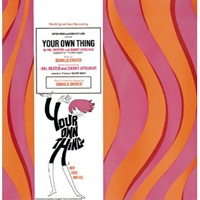 Original Broadway Cast, 1968 (RCA)
Original Broadway Cast, 1968 (RCA)  (2 / 5) “‘Tis wonder that enwraps me thus, yet ’tis not madness. What a groovy lady!” And there you have the central joke of this hit Off-Broadway musical, loosely adapted by librettist Donald Driver and songwriters Hal Hester and Danny Apolinar from Shakespeare’s Twelfth Night. Set in a swinging Illyria that looks and sounds like the East Village, where the musical played for over two years, Your Own Thing has a mild subversiveness and an abundance of electric guitars and drums (Hayward Morris’s orchestrations were beefed up for the album by Peter Matz), along with a cheerful, your-own-bag-is-where-it’s-at philosophy. Some of the songs are undiluted Shakespeare, others are closer to Hullabaloo, yet you’ll be surprised at how well “Come Away, Death” and “Hunca Munca” complement each other. Unfortunately, the performance perpetuates the bogus philosophy of so many rock musicals: pretty voices are, like, uncool, man. Leland Palmer’s breathy Viola makes some unpleasant noises, even in the ballads, while Tom Ligon’s Orson (read: Orsino) and Marcia Rodd’s Olivia are just adequate from a vocal standpoint. (Rodd replaced Marian Mercer in the show before the recording date.) Just about the only real musical-theater type on hand is Rusty (later Russ) Thacker as Sebastian; it’s a good thing that he gets some of the better material, such as “I’m on My Way to the Top” and a sweetly ironic reprise of “The Middle Years.” Much of what made Your Own Thing such a groovy evening was visual: the Beatles haircuts, the Carnaby Street threads, rear-projection gags that poked fun at everyone from John Lindsay to John Wayne, and so on. Still, the score is energetic, ingratiating, and sometimes ingenious. If only it were better sung! — Marc Miller
(2 / 5) “‘Tis wonder that enwraps me thus, yet ’tis not madness. What a groovy lady!” And there you have the central joke of this hit Off-Broadway musical, loosely adapted by librettist Donald Driver and songwriters Hal Hester and Danny Apolinar from Shakespeare’s Twelfth Night. Set in a swinging Illyria that looks and sounds like the East Village, where the musical played for over two years, Your Own Thing has a mild subversiveness and an abundance of electric guitars and drums (Hayward Morris’s orchestrations were beefed up for the album by Peter Matz), along with a cheerful, your-own-bag-is-where-it’s-at philosophy. Some of the songs are undiluted Shakespeare, others are closer to Hullabaloo, yet you’ll be surprised at how well “Come Away, Death” and “Hunca Munca” complement each other. Unfortunately, the performance perpetuates the bogus philosophy of so many rock musicals: pretty voices are, like, uncool, man. Leland Palmer’s breathy Viola makes some unpleasant noises, even in the ballads, while Tom Ligon’s Orson (read: Orsino) and Marcia Rodd’s Olivia are just adequate from a vocal standpoint. (Rodd replaced Marian Mercer in the show before the recording date.) Just about the only real musical-theater type on hand is Rusty (later Russ) Thacker as Sebastian; it’s a good thing that he gets some of the better material, such as “I’m on My Way to the Top” and a sweetly ironic reprise of “The Middle Years.” Much of what made Your Own Thing such a groovy evening was visual: the Beatles haircuts, the Carnaby Street threads, rear-projection gags that poked fun at everyone from John Lindsay to John Wayne, and so on. Still, the score is energetic, ingratiating, and sometimes ingenious. If only it were better sung! — Marc Miller
You’re a Good Man, Charlie Brown
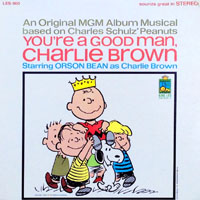 Studio Cast, 1966 (MGM/no CD)
Studio Cast, 1966 (MGM/no CD)  (3 / 5) Long out of print, this recording was one of the first musical theater “concept albums.” Few people seem to be aware that You’re a Good Man, Charlie Brown began not as an Off-Broadway show but as a recording of 10 songs by composer-lyricist Clark Gesner, inspired by Charles Schultz’s extraordinarily popular “Peanuts” comic strip. Very difficult to track down, the LP is noteworthy for several reasons aside from its historical value as the basis for one of the most successful Off-Broadway musicals ever. The four-member cast — Orson Bean as Charlie Brown, Barbara Minkus as Lucy, Bill Hinnant as Snoopy, and Gesner himself as Linus — is excellent. Although Bean is probably best remembered as a television host and game show panelist, he was a fine actor, and his Charlie Brown is endearing even if Bean never really creates the impression of being a child. Minkus, on the other hand, does have a “little girl” voice that she puts to excellent use in Lucy’s numbers, especially “Schroeder” and “The Doctor Is In.” Gesner is charming in his one solo spot, Linus’s “My Blanket and Me.” And Hinnant is thoroughly delightful as Snoopy, a role he owned for quite some time (see below). This is the only recording of YAGMCB to boast a full orchestra, led by legendary conductor Jay Blackton. Those trumpets in the title song and those strings in “Snoopy” really add something to the music. — Michael Portantiere
(3 / 5) Long out of print, this recording was one of the first musical theater “concept albums.” Few people seem to be aware that You’re a Good Man, Charlie Brown began not as an Off-Broadway show but as a recording of 10 songs by composer-lyricist Clark Gesner, inspired by Charles Schultz’s extraordinarily popular “Peanuts” comic strip. Very difficult to track down, the LP is noteworthy for several reasons aside from its historical value as the basis for one of the most successful Off-Broadway musicals ever. The four-member cast — Orson Bean as Charlie Brown, Barbara Minkus as Lucy, Bill Hinnant as Snoopy, and Gesner himself as Linus — is excellent. Although Bean is probably best remembered as a television host and game show panelist, he was a fine actor, and his Charlie Brown is endearing even if Bean never really creates the impression of being a child. Minkus, on the other hand, does have a “little girl” voice that she puts to excellent use in Lucy’s numbers, especially “Schroeder” and “The Doctor Is In.” Gesner is charming in his one solo spot, Linus’s “My Blanket and Me.” And Hinnant is thoroughly delightful as Snoopy, a role he owned for quite some time (see below). This is the only recording of YAGMCB to boast a full orchestra, led by legendary conductor Jay Blackton. Those trumpets in the title song and those strings in “Snoopy” really add something to the music. — Michael Portantiere
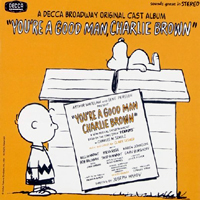 Original Off-Broadway Cast, 1967 (MGM/Decca)
Original Off-Broadway Cast, 1967 (MGM/Decca)  (4 / 5) This recording is recommended primarily for the definitive performances of its cast. Gary Burghoff, later famous as Radar O’Reilly in the long-running television series M*A*S*H , is perfect as Charlie Brown. It’s a difficult assignment in that the character has to seem hapless and “wishy-washy,” as everyone (including himself) thinks he is, yet he must be appealing and sympathetic to the audience in an Everyman sort of way. Burghoff walks that line beautifully, and is persuasive in all of Charlie’s vocal moments. Reva Rose is equally great in the role of Lucy; her semi-screaming of the high notes in “The Doctor Is In” (a.k.a. “Dr. Lucy”) is priceless, and she’s a stitch when giving tons of wrong information to brother Linus in “Little Known Facts.” Bob Balaban is an adorable Linus, and Bill Hinnant is even better as Snoopy here than he is on the concept album; he’s also given more to do, thanks to the addition of the “Red Baron” scene and other juicy sections of dialogue taken directly from the “Peanuts” strip. Karen Johnson has virtually no solo moments in the role of Patty, and Skip Hinnant (Bill’s brother) has only slightly more to do as Schroeder. There were a few significant additions to the score for the show’s stage debut as compared to what’s heard on the original recording; among them are Charlie Brown’s extended solo in “T.E.A.M.” and “Book Report,” a clever ensemble number in which Charlie, Lucy, Linus and Schroeder each take different approaches to the same homework assignment. The title song has also been expanded considerably. The score’s instrumentation here is limited to piano and percussion, but the sound quality of the recording is exceptionally good, and there’s a palpable theatricality about it. Decca Broadway’s CD reissue of the album has four bonus tracks of demos performed by Gesner and Barbara Minkus, with Gesner at the piano. — M.P.
(4 / 5) This recording is recommended primarily for the definitive performances of its cast. Gary Burghoff, later famous as Radar O’Reilly in the long-running television series M*A*S*H , is perfect as Charlie Brown. It’s a difficult assignment in that the character has to seem hapless and “wishy-washy,” as everyone (including himself) thinks he is, yet he must be appealing and sympathetic to the audience in an Everyman sort of way. Burghoff walks that line beautifully, and is persuasive in all of Charlie’s vocal moments. Reva Rose is equally great in the role of Lucy; her semi-screaming of the high notes in “The Doctor Is In” (a.k.a. “Dr. Lucy”) is priceless, and she’s a stitch when giving tons of wrong information to brother Linus in “Little Known Facts.” Bob Balaban is an adorable Linus, and Bill Hinnant is even better as Snoopy here than he is on the concept album; he’s also given more to do, thanks to the addition of the “Red Baron” scene and other juicy sections of dialogue taken directly from the “Peanuts” strip. Karen Johnson has virtually no solo moments in the role of Patty, and Skip Hinnant (Bill’s brother) has only slightly more to do as Schroeder. There were a few significant additions to the score for the show’s stage debut as compared to what’s heard on the original recording; among them are Charlie Brown’s extended solo in “T.E.A.M.” and “Book Report,” a clever ensemble number in which Charlie, Lucy, Linus and Schroeder each take different approaches to the same homework assignment. The title song has also been expanded considerably. The score’s instrumentation here is limited to piano and percussion, but the sound quality of the recording is exceptionally good, and there’s a palpable theatricality about it. Decca Broadway’s CD reissue of the album has four bonus tracks of demos performed by Gesner and Barbara Minkus, with Gesner at the piano. — M.P.
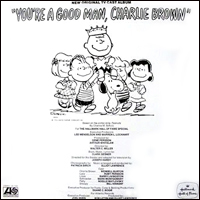 TV Cast, 1973 (Atlantic/no CD)
TV Cast, 1973 (Atlantic/no CD)  (3 / 5) Also out of print for decades, this cast album of a 1973 “Hallmark Hall of Fame” TV production of You’re a Good Man, Charlie Brown is quite enjoyable in that the company is generally strong and the score is more fully orchestrated than on the Off-Broadway recording (though less fully orchestrated than on the concept recording). The performers include Wendell Burton, who had played Charlie Brown on stage in San Francisco; Bill Hinnant, again outstanding as Snoopy; and Barry Livingston, of My Three Sons TV fame, as an appealing Linus. In the role of Lucy, Ruby Persson gives a creditable performance, far better than one would expect after noticing that she has the same last name as one of the show’s producers. Rounding out the cast are Mark Montgomery as a charming Schroeder and Noelle Matlovsky in the thankless role of Patty. If you have a working turntable hooked up to your sound system at home, a vinyl LP copy of this album is worth seeking out as more than a curiosity. — M.P.
(3 / 5) Also out of print for decades, this cast album of a 1973 “Hallmark Hall of Fame” TV production of You’re a Good Man, Charlie Brown is quite enjoyable in that the company is generally strong and the score is more fully orchestrated than on the Off-Broadway recording (though less fully orchestrated than on the concept recording). The performers include Wendell Burton, who had played Charlie Brown on stage in San Francisco; Bill Hinnant, again outstanding as Snoopy; and Barry Livingston, of My Three Sons TV fame, as an appealing Linus. In the role of Lucy, Ruby Persson gives a creditable performance, far better than one would expect after noticing that she has the same last name as one of the show’s producers. Rounding out the cast are Mark Montgomery as a charming Schroeder and Noelle Matlovsky in the thankless role of Patty. If you have a working turntable hooked up to your sound system at home, a vinyl LP copy of this album is worth seeking out as more than a curiosity. — M.P.
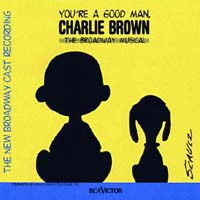 Broadway Cast, 1999 (RCA)
Broadway Cast, 1999 (RCA)  (2 / 5) When the original production of You’re a Good Man Charlie Brown transferred to Broadway after a downtown, Off-Broadway run of more than 1500 performances, it closed within a month. But the musical received countless amateur and regional productions over the years, and it may have been a fear of over-familarity that prompted the producers of the ’99 Broadway version to have composer-lyricist Andrew Lippa revise and augment the original score. Aside from aggressively rearranging Clark Gesner’s music, Lippa contributed a catchy new section of the title song, but the two new numbers he wrote from scratch are highly questionable additions: Schroeder’s “Beethoven Day” is a joyously rhythmic pop tune, the problem here being that this fussy, “serious-musician” type would never express himself in such a way; and though Kristin Chenoweth, in the newly created role of Sally Brown, somehow manages to mine comic gold from “My New Philosophy,” the song itself really isn’t that funny. There’s fine work from Anthony Rapp as Charlie Brown, Ilana Levine as Lucy, B.D. Wong as a lisping Linus, and Roger Bart in a winning turn as Snoopy. Stanley Wayne Mathis does a good job with “Beethoven Day,” but he’s as miscast in the role of Schroeder as the song is wrong for the character. The practically superfluous role of Patty was eliminated for this production and replaced by Sally, who became an integral part of the show, largely due to Chenoweth’s Tony Award-winning portrayal. — M.P.
(2 / 5) When the original production of You’re a Good Man Charlie Brown transferred to Broadway after a downtown, Off-Broadway run of more than 1500 performances, it closed within a month. But the musical received countless amateur and regional productions over the years, and it may have been a fear of over-familarity that prompted the producers of the ’99 Broadway version to have composer-lyricist Andrew Lippa revise and augment the original score. Aside from aggressively rearranging Clark Gesner’s music, Lippa contributed a catchy new section of the title song, but the two new numbers he wrote from scratch are highly questionable additions: Schroeder’s “Beethoven Day” is a joyously rhythmic pop tune, the problem here being that this fussy, “serious-musician” type would never express himself in such a way; and though Kristin Chenoweth, in the newly created role of Sally Brown, somehow manages to mine comic gold from “My New Philosophy,” the song itself really isn’t that funny. There’s fine work from Anthony Rapp as Charlie Brown, Ilana Levine as Lucy, B.D. Wong as a lisping Linus, and Roger Bart in a winning turn as Snoopy. Stanley Wayne Mathis does a good job with “Beethoven Day,” but he’s as miscast in the role of Schroeder as the song is wrong for the character. The practically superfluous role of Patty was eliminated for this production and replaced by Sally, who became an integral part of the show, largely due to Chenoweth’s Tony Award-winning portrayal. — M.P.
 Off-Broadway Cast, 2016 (Broadway Records)
Off-Broadway Cast, 2016 (Broadway Records)  (1 / 5) There exists a recording of the Humperdinck opera Hänsel und Gretel with with actual children singing the title roles, which were intended by the composer to be sung by an adult mezzo soprano and soprano (respectively). Although that may sound like a good idea in theory from the standpoint of verisimilitude, in practice it doesn’t work, because the demands of the music are beyond the abilities of pre-pubescent voices. Needless to say, if the composer had wanted these roles to be sung by children, he would have written them very differently. A similar situation exists with this cast album of the 2016 York Theatre Company production of You’re a Good Man, Charlie Brown, which featured performers ranging in age from 9 to 14 and retained the unnecessary, mostly unfortunate Andrew Lippa revisions/additions to the score. Although this show is far from operatic in style, it still requires a vocal maturity that these youngsters obviously don’t possess. The kids also generally fall short in terms of musical phrasing, comic timing, and persuasive delivery of the fair amount of spoken dialogue included on the recording; it often sounds as if their inflections were grafted onto them by the director, rather than being organic. All of that makes this the least satisfying recording of the score. Interestingly, the opening number here interpolates a couple of measures of the cool jazz trio music that Vince Guaraldi composed for the classic 1960s TV special A Charlie Brown Christmas. Justly famous and beloved as this riff is, it doesn’t fit with the original Clark Gesner songs any better than does the Lippa material. One wonders if rights had to be obtained to use it, and at what price! — M.P.
(1 / 5) There exists a recording of the Humperdinck opera Hänsel und Gretel with with actual children singing the title roles, which were intended by the composer to be sung by an adult mezzo soprano and soprano (respectively). Although that may sound like a good idea in theory from the standpoint of verisimilitude, in practice it doesn’t work, because the demands of the music are beyond the abilities of pre-pubescent voices. Needless to say, if the composer had wanted these roles to be sung by children, he would have written them very differently. A similar situation exists with this cast album of the 2016 York Theatre Company production of You’re a Good Man, Charlie Brown, which featured performers ranging in age from 9 to 14 and retained the unnecessary, mostly unfortunate Andrew Lippa revisions/additions to the score. Although this show is far from operatic in style, it still requires a vocal maturity that these youngsters obviously don’t possess. The kids also generally fall short in terms of musical phrasing, comic timing, and persuasive delivery of the fair amount of spoken dialogue included on the recording; it often sounds as if their inflections were grafted onto them by the director, rather than being organic. All of that makes this the least satisfying recording of the score. Interestingly, the opening number here interpolates a couple of measures of the cool jazz trio music that Vince Guaraldi composed for the classic 1960s TV special A Charlie Brown Christmas. Justly famous and beloved as this riff is, it doesn’t fit with the original Clark Gesner songs any better than does the Lippa material. One wonders if rights had to be obtained to use it, and at what price! — M.P.
You Arms Too Short to Box With God
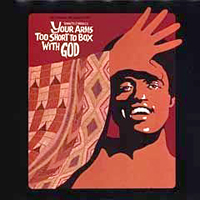 Original Broadway Cast, 1976 (ABC/no CD)
Original Broadway Cast, 1976 (ABC/no CD)  (2 / 5) Just as The Wiz was an all-black version of The Wizard of Oz, this show might be considered an all-black version of Jesus Christ Superstar. That’s true in the sense that both shows deal with the last seven days in the life of Jesus, from Palm Sunday through Good Friday to Easter Sunday, but the profound difference between them can be gleaned from a glance at the tune stack. While the entire score of Superstar is by Andrew Lloyd Webber and Tim Rice, the song list for Your Arms Too Short to Box With God is littered with asterisks, plus signs, and minus signs before the various titles to indicate different authorship. Eight of the songs were written by Micki Grant, nine by Alex Bradford, and one by H.B. Barnum. They’re all gospel tunes that attempt to be stirring, but none of them has any real power, passion, or distinction. To paraphrase a much better show on the same subject: You won’t know how to love them. — Peter Filichia
(2 / 5) Just as The Wiz was an all-black version of The Wizard of Oz, this show might be considered an all-black version of Jesus Christ Superstar. That’s true in the sense that both shows deal with the last seven days in the life of Jesus, from Palm Sunday through Good Friday to Easter Sunday, but the profound difference between them can be gleaned from a glance at the tune stack. While the entire score of Superstar is by Andrew Lloyd Webber and Tim Rice, the song list for Your Arms Too Short to Box With God is littered with asterisks, plus signs, and minus signs before the various titles to indicate different authorship. Eight of the songs were written by Micki Grant, nine by Alex Bradford, and one by H.B. Barnum. They’re all gospel tunes that attempt to be stirring, but none of them has any real power, passion, or distinction. To paraphrase a much better show on the same subject: You won’t know how to love them. — Peter Filichia
You Never Know
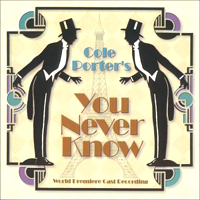 Pasadena Playhouse Cast, 2001 (Fynsworth Alley/Ghostlight)
Pasadena Playhouse Cast, 2001 (Fynsworth Alley/Ghostlight)  (3 / 5) This 1938 flop is a musical adaptation, with songs by Cole Porter and a book by Rowland Leigh, of Siegfried Geyer’s By Candlelight, which was itself an adaptation of a Viennese operetta. In the 1980s, musical maven Paul Lazarus put together a new version of the tuner from bits of the original, interpolated some songs from other Porter works, and then tried out the result at a couple of regional theaters. This recording is based on the 1991 Pasadena Playhouse production, and is labeled as the “world premiere recording” of the piece. (A cast album of a 1973 Off-Broadway revival of the original version apparently exists, but it’s an extremely rare item.) The big numbers retained from the original score are “From Alpha to Omega” and “At Long Last Love” — but, for some inexplicable reason, Lazarus doesn’t include all the lyrics to either of those songs. What is here is extremely well sung by Kristin Chenoweth, Harry Groener, Donna McKechnie, David Garrison, Angela Teek, and record producer Bruce Kimmel in his Guy Haines incarnation. — David Finkle
(3 / 5) This 1938 flop is a musical adaptation, with songs by Cole Porter and a book by Rowland Leigh, of Siegfried Geyer’s By Candlelight, which was itself an adaptation of a Viennese operetta. In the 1980s, musical maven Paul Lazarus put together a new version of the tuner from bits of the original, interpolated some songs from other Porter works, and then tried out the result at a couple of regional theaters. This recording is based on the 1991 Pasadena Playhouse production, and is labeled as the “world premiere recording” of the piece. (A cast album of a 1973 Off-Broadway revival of the original version apparently exists, but it’s an extremely rare item.) The big numbers retained from the original score are “From Alpha to Omega” and “At Long Last Love” — but, for some inexplicable reason, Lazarus doesn’t include all the lyrics to either of those songs. What is here is extremely well sung by Kristin Chenoweth, Harry Groener, Donna McKechnie, David Garrison, Angela Teek, and record producer Bruce Kimmel in his Guy Haines incarnation. — David Finkle
A Year With Frog and Toad
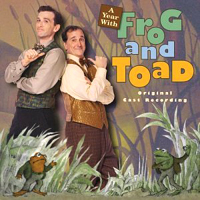 Original Cast, 2002 (PS Classics)
Original Cast, 2002 (PS Classics)  (3 / 5) Although A Year With Frog and Toad played only a short time on Broadway in 2003, previous runs at the Children’s Theatre Company of Minneapolis (where the show got started) and Off-Broadway were successful enough to yield this playful cast recording. The show is faithful to the Arnold Lobel books on which it was based, and the album documents the witty songs by composer Robert Reale and lyricist-librettist Willie Reale that perfectly capture four seasons in the lives of two amphibian friends. These roles are nicely performed by Jay Goede and Mark Linn-Baker, with Danielle Ferland, Kate Reinders (who didn’t go to Broadway with the show), and Frank Vlastnik rounding out the cast and each getting plenty of opportunity to shine. In “The Letter” and its numerous reprises, Vlastnik’s depiction of the Snail’s determination to deliver the mail is almost as funny on the recording as it was onstage; and his 11 o’clock number, “I’m Coming Out of My Shell,” is one of the score’s treasures. There are warm moments, including Goede’s touching “Alone” and the sweet “Merry Almost Christmas,” but it’s the writers’ willingness to embrace innocent fun in songs such as “Cookies” and “Getta Loada Toad” that makes this a really special show — one of the most charming new musicals in years, and one that can truly be enjoyed by the whole family. — Matthew Murray
(3 / 5) Although A Year With Frog and Toad played only a short time on Broadway in 2003, previous runs at the Children’s Theatre Company of Minneapolis (where the show got started) and Off-Broadway were successful enough to yield this playful cast recording. The show is faithful to the Arnold Lobel books on which it was based, and the album documents the witty songs by composer Robert Reale and lyricist-librettist Willie Reale that perfectly capture four seasons in the lives of two amphibian friends. These roles are nicely performed by Jay Goede and Mark Linn-Baker, with Danielle Ferland, Kate Reinders (who didn’t go to Broadway with the show), and Frank Vlastnik rounding out the cast and each getting plenty of opportunity to shine. In “The Letter” and its numerous reprises, Vlastnik’s depiction of the Snail’s determination to deliver the mail is almost as funny on the recording as it was onstage; and his 11 o’clock number, “I’m Coming Out of My Shell,” is one of the score’s treasures. There are warm moments, including Goede’s touching “Alone” and the sweet “Merry Almost Christmas,” but it’s the writers’ willingness to embrace innocent fun in songs such as “Cookies” and “Getta Loada Toad” that makes this a really special show — one of the most charming new musicals in years, and one that can truly be enjoyed by the whole family. — Matthew Murray
Working
 Original Broadway Cast, 1978 (Columbia/Masterworks Broadway)
Original Broadway Cast, 1978 (Columbia/Masterworks Broadway)  (4 / 5) Studs Terkel’s Working, the 1972 best-selling volume of interviews with Americans discussing the pros and cons of their occupations, struck Stephen Schwartz as a good basis for a musical; so he set about rounding up a group of songwriters, in addition to himself, to musicalize Terkel’s pungent, poignant chats. Craig Carnelia, Micki Grant, James Taylor, Mary Rodgers, Susan Birkenhead, and Schwartz turned out the song vignettes, and everyone from a newsboy to a housewife to a cleaning lady to a retiree showed up onstage to declare their highs and woes. A number of the songs — including Carnelia’s “Just a Housewife” and “The Mason,” and Schwartz’s “It’s an Art” — became popular on the cabaret circuit. Grant’s swinging “Cleaning Women” is another catchy item, as is just about everything else on this resonant recording, which benefits from Kirk Nurock’s tingling arrangements of the songs. To represent the hard-working multitudes, Schwartz tapped some stalwart performers: Lenora Nemetz, Joe Mantegna, Amy Freeman, Susan Bigelow, David Patrick Kelly, Bob Gunton, and others put elbow grease into their singing. The cast is so rich in talent that Patti LuPone appears in the ensemble, with no solo spot. Fynsworth Alley’s CD includes six bonus tracks, four of them featuring Carnelia singing his own songs in his tremulous baritone. — David Finkle
(4 / 5) Studs Terkel’s Working, the 1972 best-selling volume of interviews with Americans discussing the pros and cons of their occupations, struck Stephen Schwartz as a good basis for a musical; so he set about rounding up a group of songwriters, in addition to himself, to musicalize Terkel’s pungent, poignant chats. Craig Carnelia, Micki Grant, James Taylor, Mary Rodgers, Susan Birkenhead, and Schwartz turned out the song vignettes, and everyone from a newsboy to a housewife to a cleaning lady to a retiree showed up onstage to declare their highs and woes. A number of the songs — including Carnelia’s “Just a Housewife” and “The Mason,” and Schwartz’s “It’s an Art” — became popular on the cabaret circuit. Grant’s swinging “Cleaning Women” is another catchy item, as is just about everything else on this resonant recording, which benefits from Kirk Nurock’s tingling arrangements of the songs. To represent the hard-working multitudes, Schwartz tapped some stalwart performers: Lenora Nemetz, Joe Mantegna, Amy Freeman, Susan Bigelow, David Patrick Kelly, Bob Gunton, and others put elbow grease into their singing. The cast is so rich in talent that Patti LuPone appears in the ensemble, with no solo spot. Fynsworth Alley’s CD includes six bonus tracks, four of them featuring Carnelia singing his own songs in his tremulous baritone. — David Finkle
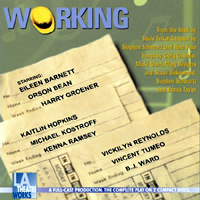 Los Angeles Cast, 1999 (L.A. Theatre Works, 2CDs)
Los Angeles Cast, 1999 (L.A. Theatre Works, 2CDs)  (3 / 5) For this revival of Working, Stephen Schwartz updated the Studs Terkel adaptation he’d overseen decades earlier and to which he had contributed along with the other composers and lyricists named in the review above. Along with adding more contemporary references, as for example to computers in the workplace, Schwartz used this recording opportunity to create a document of almost the entire show. The album includes not only the potent songs but also the pithy monologues that were lifted from Terkel’s best-seller and then tweaked for dramatic effect. As a result, a much more rounded sense of the show’s power is captured, as compared with the original Broadway cast recording. The company assembled by L.A. Theatre Works mover and shaker Susan Albert Loewenberg includes Orson Bean, Harry Groener, B.J. Ward, Michael Kostroff, Eileen Barnett, Kaitlin Hopkins, Vincent Tumeo, Kenna Ramsey, and Vickilyn Reynolds. Performing before a live audience only a few times, these singing actors may not have had time to achieve the polish of a cast who’ve refined the material during a longer run, but there is certainly no featherbedding here. And it sure is a treat to hear the always lovable Bean, whose list of Broadway credits is surprisingly short, doing so well by Craig Carnelia’s “Joe.” — D.F.
(3 / 5) For this revival of Working, Stephen Schwartz updated the Studs Terkel adaptation he’d overseen decades earlier and to which he had contributed along with the other composers and lyricists named in the review above. Along with adding more contemporary references, as for example to computers in the workplace, Schwartz used this recording opportunity to create a document of almost the entire show. The album includes not only the potent songs but also the pithy monologues that were lifted from Terkel’s best-seller and then tweaked for dramatic effect. As a result, a much more rounded sense of the show’s power is captured, as compared with the original Broadway cast recording. The company assembled by L.A. Theatre Works mover and shaker Susan Albert Loewenberg includes Orson Bean, Harry Groener, B.J. Ward, Michael Kostroff, Eileen Barnett, Kaitlin Hopkins, Vincent Tumeo, Kenna Ramsey, and Vickilyn Reynolds. Performing before a live audience only a few times, these singing actors may not have had time to achieve the polish of a cast who’ve refined the material during a longer run, but there is certainly no featherbedding here. And it sure is a treat to hear the always lovable Bean, whose list of Broadway credits is surprisingly short, doing so well by Craig Carnelia’s “Joe.” — D.F.
Wonderful Town
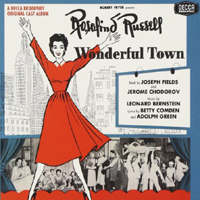 Original Broadway Cast, 1953 (Decca/MCA)
Original Broadway Cast, 1953 (Decca/MCA)  (4 / 5) Nine years after their breakthrough show, On the Town, composer Leonard Bernstein and lyricists Betty Comden and Adolph Green were hired on very short notice to provide a replacement score for Wonderful Town. Their excellent work was initially overshadowed by a dominant star, Rosalind Russell, who had headlined a 1942 non-musical film version of Ruth Sherwood’s comic memoir My Sister Eileen and agreed to become a song-and-dance gal for the Broadway musical adaptation. The show’s success was immediate, with one critic chiming “Roz for President.” Russell’s ace timing and her rough-and-ready way with her numbers, including the comedic showpiece “One Hundred Easy Ways (to Lose a Man),” were so beguiling that the merits of the score weren’t fully appreciated right away; filled with wit and sharp pastiche, it cleverly gives the more legit music to others in order to let Russell’s Ruth thrive within a limited vocal range. The original cast album conveys much of the show’s magic, notably the complex comedy-and-music structure of “Conversation Piece”; the gentle parody “Ohio,” in which Russell harmonizes with the sweet yet assertive Eileen of Edith (later Edie) Adams; and the wild “Conga!” with men from the the Brazilian navy. No one would say that Russell was a singer of any polish, nor does her vocal tone fall liltingly on the ear. Subsequent Ruths would have more voice, but Russell was unique and irresistible. — Richard Barrios
(4 / 5) Nine years after their breakthrough show, On the Town, composer Leonard Bernstein and lyricists Betty Comden and Adolph Green were hired on very short notice to provide a replacement score for Wonderful Town. Their excellent work was initially overshadowed by a dominant star, Rosalind Russell, who had headlined a 1942 non-musical film version of Ruth Sherwood’s comic memoir My Sister Eileen and agreed to become a song-and-dance gal for the Broadway musical adaptation. The show’s success was immediate, with one critic chiming “Roz for President.” Russell’s ace timing and her rough-and-ready way with her numbers, including the comedic showpiece “One Hundred Easy Ways (to Lose a Man),” were so beguiling that the merits of the score weren’t fully appreciated right away; filled with wit and sharp pastiche, it cleverly gives the more legit music to others in order to let Russell’s Ruth thrive within a limited vocal range. The original cast album conveys much of the show’s magic, notably the complex comedy-and-music structure of “Conversation Piece”; the gentle parody “Ohio,” in which Russell harmonizes with the sweet yet assertive Eileen of Edith (later Edie) Adams; and the wild “Conga!” with men from the the Brazilian navy. No one would say that Russell was a singer of any polish, nor does her vocal tone fall liltingly on the ear. Subsequent Ruths would have more voice, but Russell was unique and irresistible. — Richard Barrios
 Television Cast, 1958 (Columbia/Sony Broadway)
Television Cast, 1958 (Columbia/Sony Broadway)  (4 / 5) Wonderful Town was one of the glories of the age of the television musical spectacular. Repeating her stage role, Rosalind Russell was supported by a mostly new company, although Jordan Bentley as the dumb jock and Cris Alexander as the drugstore guy were retained from the original cast. Recorded in stereo, this album stacks up quite well against the mono original. Jacqueline McKeever is nearly as good an Eileen as Edith (Edie) Adams. Sydney Chaplin as Bob Baker seems more suitably cast to type than the Broadway production’s George Gaynes, and he does a persuasive job with “A Quiet Girl” and “It’s Love” even though he has far less voice. On the minus side, the intervening five years (and countless performances of Auntie Mame) had taken a toll on Russell; while the verve and humor are still there, albeit with an added soupçon of diva attitude, her vocal decline exacerbates her tendency to bully her way through the music by hook or by crook. But she’s still Roz, and this is a fine recording of the score overall. — R.B.
(4 / 5) Wonderful Town was one of the glories of the age of the television musical spectacular. Repeating her stage role, Rosalind Russell was supported by a mostly new company, although Jordan Bentley as the dumb jock and Cris Alexander as the drugstore guy were retained from the original cast. Recorded in stereo, this album stacks up quite well against the mono original. Jacqueline McKeever is nearly as good an Eileen as Edith (Edie) Adams. Sydney Chaplin as Bob Baker seems more suitably cast to type than the Broadway production’s George Gaynes, and he does a persuasive job with “A Quiet Girl” and “It’s Love” even though he has far less voice. On the minus side, the intervening five years (and countless performances of Auntie Mame) had taken a toll on Russell; while the verve and humor are still there, albeit with an added soupçon of diva attitude, her vocal decline exacerbates her tendency to bully her way through the music by hook or by crook. But she’s still Roz, and this is a fine recording of the score overall. — R.B.
 London Cast, 1986 (First Night)
London Cast, 1986 (First Night)  (3 / 5) Quality will out, at least some of the time, and Wonderful Town was finally appreciated on its own merits in the enthusiastically received London revival that yielded this recording. Even with a scaled-down orchestra that included a synthesizer, this production soared. The strong craftsmanship of the show was more apparent than ever because its wagon wasn’t hitched to a big star. Maureen Lipman’s expert performance as Ruth is smart, deadpan-witty, hopeful, exuberant, and incisive; Lipman has no difficulty with the character or the songs, and her American accent is fine. The Eileen of Emily Morgan is sweet, if a shade thin-voiced, and Ray Lonnen is a bit weak as Bob Baker, but the rest of the cast is energetic and committed even as they struggle with their American accents. This is an enjoyable performance that makes a good case for the show as more of an an ensemble piece than a star vehicle. — R.B.
(3 / 5) Quality will out, at least some of the time, and Wonderful Town was finally appreciated on its own merits in the enthusiastically received London revival that yielded this recording. Even with a scaled-down orchestra that included a synthesizer, this production soared. The strong craftsmanship of the show was more apparent than ever because its wagon wasn’t hitched to a big star. Maureen Lipman’s expert performance as Ruth is smart, deadpan-witty, hopeful, exuberant, and incisive; Lipman has no difficulty with the character or the songs, and her American accent is fine. The Eileen of Emily Morgan is sweet, if a shade thin-voiced, and Ray Lonnen is a bit weak as Bob Baker, but the rest of the cast is energetic and committed even as they struggle with their American accents. This is an enjoyable performance that makes a good case for the show as more of an an ensemble piece than a star vehicle. — R.B.
 Studio Cast, 1996 (JAY-TER, 2CDs)
Studio Cast, 1996 (JAY-TER, 2CDs)  (4 / 5) This complete recording of Wonderful Town, including all of the music cues and dances, was welcome. Karen Mason sings very well as Ruth, and she doesn’t stint on the comedy in one of the score’s and the album’s highlights: the hilarious “Ruth’s Stories” sequence, with its “literary” quick-changes and droll Bernstein interjections. Rebecca Luker is an outstanding Eileen, if perhaps a shade too aware of her own charm, and Ron Raines is a better Baker than his predecessors. Conductor John Owen Edwards does his customary efficient work, the supporting cast and chorus are fine, and the extended dialogue sections give a real sense of the show. — R.B.
(4 / 5) This complete recording of Wonderful Town, including all of the music cues and dances, was welcome. Karen Mason sings very well as Ruth, and she doesn’t stint on the comedy in one of the score’s and the album’s highlights: the hilarious “Ruth’s Stories” sequence, with its “literary” quick-changes and droll Bernstein interjections. Rebecca Luker is an outstanding Eileen, if perhaps a shade too aware of her own charm, and Ron Raines is a better Baker than his predecessors. Conductor John Owen Edwards does his customary efficient work, the supporting cast and chorus are fine, and the extended dialogue sections give a real sense of the show. — R.B.
 Studio Cast, 1998 (EMI)
Studio Cast, 1998 (EMI)  (3 / 5) Conductor Simon Rattle, a Leonard Bernstein partisan, decided to give the Wonderful Town score another big studio recording. His Ruth is Kim Criswell, a veteran of many show albums. The much-loved Broadway musical star Audra McDonald is Eileen, and the imposing operatic baritone Thomas Hampson is Bob Baker. This time, the composer and conductor are the stars of what is orchestrally the best Wonderful Town ever recorded. Under Sir Simon, the Birmingham Contemporary Music Group sounds like the finest Broadway pit orchestra of all time; every instrumental line is transparently clear, and the whole of it is a testament to Bernstein’s wit, lyricism, and comedic savvy. The usual balance of the score is further shifted with the ascension of Eileen; even though McDonald’s voice might be a shade mature for the role, she’s such an intelligent and intuitive artist that she vocally dominates the proceedings. Criswell tries hard, but her characterization is all on the surface, with lots of shtick accessories applied. Hampson overwhelms and over-sings his role, though he does add some good humor to the “Rigoletto” line in “What a Waste.” Brent Barrett’s “Pass the Football” is well sung, and operatic baritone Rodney Gilfry is excellent in two small roles. — R.B.
(3 / 5) Conductor Simon Rattle, a Leonard Bernstein partisan, decided to give the Wonderful Town score another big studio recording. His Ruth is Kim Criswell, a veteran of many show albums. The much-loved Broadway musical star Audra McDonald is Eileen, and the imposing operatic baritone Thomas Hampson is Bob Baker. This time, the composer and conductor are the stars of what is orchestrally the best Wonderful Town ever recorded. Under Sir Simon, the Birmingham Contemporary Music Group sounds like the finest Broadway pit orchestra of all time; every instrumental line is transparently clear, and the whole of it is a testament to Bernstein’s wit, lyricism, and comedic savvy. The usual balance of the score is further shifted with the ascension of Eileen; even though McDonald’s voice might be a shade mature for the role, she’s such an intelligent and intuitive artist that she vocally dominates the proceedings. Criswell tries hard, but her characterization is all on the surface, with lots of shtick accessories applied. Hampson overwhelms and over-sings his role, though he does add some good humor to the “Rigoletto” line in “What a Waste.” Brent Barrett’s “Pass the Football” is well sung, and operatic baritone Rodney Gilfry is excellent in two small roles. — R.B.
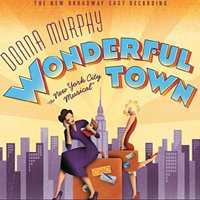 Broadway Cast, 2003 (DRG)
Broadway Cast, 2003 (DRG)  (4 / 5) As the preceding roster of Wonderful Town recordings attests, this score has been especially fortunate in the studio. That certainly applies to the cast album of the 2003 Broadway revival, which was based on the 2000 City Center Encores! presentation starring Donna Murphy. Not since Roz Russell has a star so completely dominated the proceedings — and this one can really sing! Murphy is a sensational Ruth, wry and funny and romantic by turns, all the while interacting fully with the other performers. Just listen to the spectrum of vocal colors she produces in “Swing” and you’ll know that a true musical comedy expert is at work here. Jennifer Westfeldt is a charming Eileen, the rest of the cast (including Gregg Edelman and Michael McGrath) operates at a high level, and Rob Fisher conducts Bernstein’s terrific score with his usual skill. As an appendix, DRG has included recordings of four songs from the show as performed by Betty Comden and Adolph Green circa 1953. — R.B.
(4 / 5) As the preceding roster of Wonderful Town recordings attests, this score has been especially fortunate in the studio. That certainly applies to the cast album of the 2003 Broadway revival, which was based on the 2000 City Center Encores! presentation starring Donna Murphy. Not since Roz Russell has a star so completely dominated the proceedings — and this one can really sing! Murphy is a sensational Ruth, wry and funny and romantic by turns, all the while interacting fully with the other performers. Just listen to the spectrum of vocal colors she produces in “Swing” and you’ll know that a true musical comedy expert is at work here. Jennifer Westfeldt is a charming Eileen, the rest of the cast (including Gregg Edelman and Michael McGrath) operates at a high level, and Rob Fisher conducts Bernstein’s terrific score with his usual skill. As an appendix, DRG has included recordings of four songs from the show as performed by Betty Comden and Adolph Green circa 1953. — R.B.
The Zulu and the Zayda
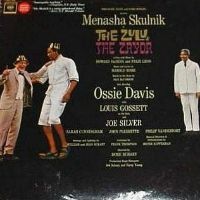 Original Broadway Cast, 1965 (Columbia)
Original Broadway Cast, 1965 (Columbia)  (1 / 5) This was an odd little show, billed as “a play with music.” Columbia probably decided to record The Zulu and the Zayda because the songs were written by composer-lyricist Harold Rome. The fact that the cast included Menasha Skulnik, a Yiddish theater star in one of his final performances, plus Ossie Davis and Louis Gossett, perhaps enhanced the label’s interest. The score combines South African folk-style music and Yiddish theater-style songs. Particularly catchy is the first-act closer: Skulnik gives his new-found African friends a lesson in Yiddish, teaching them the meaning of “Oisgetzaichnet” (translation: “Out of this world!”) after they have sung “Like the Breeze Blows,” an uplifting song of freedom. Skulnik’s duet with Gossett, “It’s Good to Be Alive,” is charming, as is his solo “River of Tears.” Most of the songs are attractive, but this is not a full-scale musical. The recording is for cast album completists, alphabetically the last in their collections. — Jeffrey Dunn
(1 / 5) This was an odd little show, billed as “a play with music.” Columbia probably decided to record The Zulu and the Zayda because the songs were written by composer-lyricist Harold Rome. The fact that the cast included Menasha Skulnik, a Yiddish theater star in one of his final performances, plus Ossie Davis and Louis Gossett, perhaps enhanced the label’s interest. The score combines South African folk-style music and Yiddish theater-style songs. Particularly catchy is the first-act closer: Skulnik gives his new-found African friends a lesson in Yiddish, teaching them the meaning of “Oisgetzaichnet” (translation: “Out of this world!”) after they have sung “Like the Breeze Blows,” an uplifting song of freedom. Skulnik’s duet with Gossett, “It’s Good to Be Alive,” is charming, as is his solo “River of Tears.” Most of the songs are attractive, but this is not a full-scale musical. The recording is for cast album completists, alphabetically the last in their collections. — Jeffrey Dunn
Zorba
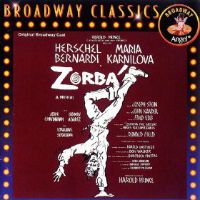 Original Broadway Cast, 1968 (Capitol)
Original Broadway Cast, 1968 (Capitol)  (5 / 5) Are you sitting down? When I saw Zorba in its original Broadway production (not the horrible Anthony Quinn revival; see below), I thought it a better show than Cabaret, the previous Broadway outing of the team that put this show together: composer John Kander, lyricist Fred Ebb, and director Harold Prince. To me, Zorba is more emotional, deals with life more broadly, and is brilliantly theatrical. Whereas many Kander and Ebb musicals are made up of a succession of special-material songs, this one has an honest, mature, character- and plot-driven score. The opening number, “Life Is,” perfectly sets the theme of the evening. (The first line, “Life is what you do while you’re waiting to die,” was watered down to “Life is what you do till the moment you die” for later productions.) “Happy Birthday” is a wonderfully touching number for the death scene of Madame Hortense, while “Why Can’t I Speak” is a very beautiful song that exemplifies the protagonist Niko’s emotional problems. Although some of the events in Joseph Stein’s libretto are tragic, the audience leaves the theater moved, enlightened, even uplifted — and the cast album has the same effect on the listener. Herschel Bernardi, Maria Karnilova, John Cunningham, Carmen Alvarez, and Lorraine Serabian drive the recording with their sincerity, energy, and abundant talent. — Ken Bloom
(5 / 5) Are you sitting down? When I saw Zorba in its original Broadway production (not the horrible Anthony Quinn revival; see below), I thought it a better show than Cabaret, the previous Broadway outing of the team that put this show together: composer John Kander, lyricist Fred Ebb, and director Harold Prince. To me, Zorba is more emotional, deals with life more broadly, and is brilliantly theatrical. Whereas many Kander and Ebb musicals are made up of a succession of special-material songs, this one has an honest, mature, character- and plot-driven score. The opening number, “Life Is,” perfectly sets the theme of the evening. (The first line, “Life is what you do while you’re waiting to die,” was watered down to “Life is what you do till the moment you die” for later productions.) “Happy Birthday” is a wonderfully touching number for the death scene of Madame Hortense, while “Why Can’t I Speak” is a very beautiful song that exemplifies the protagonist Niko’s emotional problems. Although some of the events in Joseph Stein’s libretto are tragic, the audience leaves the theater moved, enlightened, even uplifted — and the cast album has the same effect on the listener. Herschel Bernardi, Maria Karnilova, John Cunningham, Carmen Alvarez, and Lorraine Serabian drive the recording with their sincerity, energy, and abundant talent. — Ken Bloom
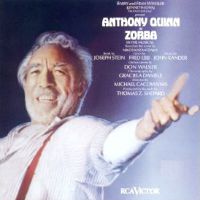 Broadway Cast, 1983 (RCA)
Broadway Cast, 1983 (RCA)  (2 / 5) Anthony Quinn and Lila Kedrova, who so memorably played the title character and Mme. Hortense in the 1964 non-musical film Zorba the Greek, starred in this revival of the Kander-Ebb-Stein musical Zorba under the direction of Michael Cacoyannis, who had directed the film. Unfortunately, Quinn sings so poorly here that many listeners will find this recording unlistenable. The other performers, including Robert Westenberg as Niko and Debbie Shapiro (later Debbie Shapiro Gravitte, later Debbie Gravitte) as The Woman (previously known as the Leader), fare much better, but the original Broadway cast recording is the one to get. — K.B.
(2 / 5) Anthony Quinn and Lila Kedrova, who so memorably played the title character and Mme. Hortense in the 1964 non-musical film Zorba the Greek, starred in this revival of the Kander-Ebb-Stein musical Zorba under the direction of Michael Cacoyannis, who had directed the film. Unfortunately, Quinn sings so poorly here that many listeners will find this recording unlistenable. The other performers, including Robert Westenberg as Niko and Debbie Shapiro (later Debbie Shapiro Gravitte, later Debbie Gravitte) as The Woman (previously known as the Leader), fare much better, but the original Broadway cast recording is the one to get. — K.B.
Zombie Prom
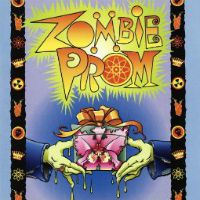 Original Off-Broadway Cast, 1996 (First Night)
Original Off-Broadway Cast, 1996 (First Night)  (4 / 5) The talented team of librettist-lyricist John Dempsey and composer Dana P. Rowe mined the familiar terrain of Little Shop/Rocky Horror teen-nostalgia-science-fiction-horror, then threw in a little Bye Bye Birdie and Grease, and came up with this short-running, Off-Broadway lark. As the title suggests, it’s about an undead senior in Eisenhower’s America who comes back to attend his high school prom and reclaim the love of Toffee, his sweetheart. Sure, Zombie Prom is a goof — but it’s a well-structured, modestly scaled goof with smart pastiche melodies and fun, intelligent lyrics that really rhyme. Listen to how smoothly the songs segue into dialogue and into other songs on this spiffily produced recording, which features an appreciative essay by musical theater historian Martin Gottfried. And the cast is among the best of the 1990s: Jessica-Snow Wilson is quite an adorable Toffee (“Where once that girl was effervescent / She’s now a poster-child depressant / A problematic post-pubescent”), while Richard Roland is a sweet, supple-voiced zombie. As a scandal-sheet editor who gets mixed up with the denizens of Enrico Fermi High, Richard Muenz for once finds a role wherein his natural hamminess is an asset. And as Delilah Strict, the school’s horrifying principal, Karen Murphy is a powerful-voiced camp diva with just the right sense of mockery. In the theater, her “Rules, Regulations, and Respect” stopped the show; we’re lucky to have it preserved here. — Marc Miller
(4 / 5) The talented team of librettist-lyricist John Dempsey and composer Dana P. Rowe mined the familiar terrain of Little Shop/Rocky Horror teen-nostalgia-science-fiction-horror, then threw in a little Bye Bye Birdie and Grease, and came up with this short-running, Off-Broadway lark. As the title suggests, it’s about an undead senior in Eisenhower’s America who comes back to attend his high school prom and reclaim the love of Toffee, his sweetheart. Sure, Zombie Prom is a goof — but it’s a well-structured, modestly scaled goof with smart pastiche melodies and fun, intelligent lyrics that really rhyme. Listen to how smoothly the songs segue into dialogue and into other songs on this spiffily produced recording, which features an appreciative essay by musical theater historian Martin Gottfried. And the cast is among the best of the 1990s: Jessica-Snow Wilson is quite an adorable Toffee (“Where once that girl was effervescent / She’s now a poster-child depressant / A problematic post-pubescent”), while Richard Roland is a sweet, supple-voiced zombie. As a scandal-sheet editor who gets mixed up with the denizens of Enrico Fermi High, Richard Muenz for once finds a role wherein his natural hamminess is an asset. And as Delilah Strict, the school’s horrifying principal, Karen Murphy is a powerful-voiced camp diva with just the right sense of mockery. In the theater, her “Rules, Regulations, and Respect” stopped the show; we’re lucky to have it preserved here. — Marc Miller
Ziegfeld Follies of 1936
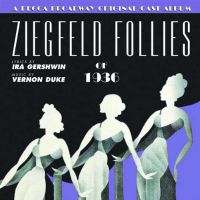 Encores! Concert Cast, 1999 (Decca)
Encores! Concert Cast, 1999 (Decca)  (5 / 5) You can always tell an overture arranged and orchestrated by Hans Spialek: The brass section announces something important, the woodwinds flutter and swoop upward in anticipation, and the tension builds to a point where the only thing that can break it is a great song. Spialek’s overture to Vernon Duke’s score for Ziegfeld Follies of 1936 takes in one standard (“I Can’t Get Started”) and several interesting not-quite-standards (“My Red-Letter Day,” “Words Without Music,” “Island in the West Indies”). As conducted superbly by Rob Fisher, it’s the entry point to one of the most fully realized excursions into the past ever attempted by City Center Encores! With the series’ repertoire having grown safer over the years, this title was a real anomaly: an ancient, not particularly well-regarded topical revue with forgotten Ira Gershwin lyrics and an all-star cast that could never be replicated. Well, are you in for a surprise. Nearly every number is a gem, and nearly every member of the Encores! cast is up to the material. “Words Without Music” has one of the strangest, most sophisticated melodies written for Broadway in the 1930s, and Ruthie Henshall matches Gertrude Niesen, who introduced it, for individuality; throaty and idiosyncratic, Henshall is like Tammy Grimes with more musicality. Christine Ebersole, handling Eve Arden’s songs, is insinuating in “Island in the West Indies” (which serves up another fabulous Spialek arrangement) and hilarious in “The Economic Situation,” a fascinating Gershwin curiosity. Later, Ebersole shares “I Can’t Get Started” with Peter Scolari, who perfectly emulates Bob Hope’s comic-leading-man timing and light-but-secure voice. So luxurious is the casting that such Broadway stalwarts as Howard McGillin, Jim and Bob Walton, and Karen Ziemba are nearly crowded out, though all are exemplary in what they’re given to do. Stephanie Pope lacks heat here, and Mary Testa is a slightly bland Fanny Brice — but when a time capsule is this beautifully engineered, the best thing to do is stifle all quibbles, climb aboard, and enjoy the ride. Great cover art, too. — Marc Miller
(5 / 5) You can always tell an overture arranged and orchestrated by Hans Spialek: The brass section announces something important, the woodwinds flutter and swoop upward in anticipation, and the tension builds to a point where the only thing that can break it is a great song. Spialek’s overture to Vernon Duke’s score for Ziegfeld Follies of 1936 takes in one standard (“I Can’t Get Started”) and several interesting not-quite-standards (“My Red-Letter Day,” “Words Without Music,” “Island in the West Indies”). As conducted superbly by Rob Fisher, it’s the entry point to one of the most fully realized excursions into the past ever attempted by City Center Encores! With the series’ repertoire having grown safer over the years, this title was a real anomaly: an ancient, not particularly well-regarded topical revue with forgotten Ira Gershwin lyrics and an all-star cast that could never be replicated. Well, are you in for a surprise. Nearly every number is a gem, and nearly every member of the Encores! cast is up to the material. “Words Without Music” has one of the strangest, most sophisticated melodies written for Broadway in the 1930s, and Ruthie Henshall matches Gertrude Niesen, who introduced it, for individuality; throaty and idiosyncratic, Henshall is like Tammy Grimes with more musicality. Christine Ebersole, handling Eve Arden’s songs, is insinuating in “Island in the West Indies” (which serves up another fabulous Spialek arrangement) and hilarious in “The Economic Situation,” a fascinating Gershwin curiosity. Later, Ebersole shares “I Can’t Get Started” with Peter Scolari, who perfectly emulates Bob Hope’s comic-leading-man timing and light-but-secure voice. So luxurious is the casting that such Broadway stalwarts as Howard McGillin, Jim and Bob Walton, and Karen Ziemba are nearly crowded out, though all are exemplary in what they’re given to do. Stephanie Pope lacks heat here, and Mary Testa is a slightly bland Fanny Brice — but when a time capsule is this beautifully engineered, the best thing to do is stifle all quibbles, climb aboard, and enjoy the ride. Great cover art, too. — Marc Miller
Ziegfeld Follies of 1919
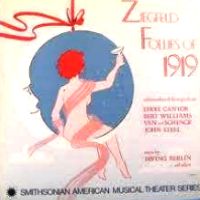 Original Cast, 1919-20 (Smithsonian/no CD)
Original Cast, 1919-20 (Smithsonian/no CD)  (3 / 5) By the time of its 13th edition, Ziegfeld’s legendary beauty-and-music revue was a Broadway institution. Some historians hold that this 1919 version was the greatest of all Follies, although others feel that the 1936 version, headlined by Bob Hope and Josephine Baker, brought the revue to a brilliant, posthumous apex four years after Ziegfeld’s death. Fortunately, a large number of recordings exist to back up claims for the Ziegfield Follies of 1919. This was probably the most star-laden of all the editions: Eddie Cantor, Bert Williams, Marilyn Miller, Van and Schenck, Eddie Dowling, and, in a cornerstone of Broadway mythology, tenor John Steel introducing Irving Berlin’s “A Pretty Girl Is Like a Melody.” Not all of the cast members made recordings of their contributions, but enough remained for The Smithsonian Collection to issue a fine compilation. Here is the tragically short-lived Williams in “Somebody” and “Everybody Wants a Key to My Cellar,” Cantor having a ball with Berlin’s “You’d Be Surprised,” and Van and Schenck’s distinctive, close harmony in “”Mandy.” The sound quality of these acoustical recordings is variable and distinctly Io-fi, but here is history come to life. (One succulent item was dropped from the show during tryouts and not recorded: “Perfume of Opium.”) The album’s annotations are excellent. — Richard Barrios
(3 / 5) By the time of its 13th edition, Ziegfeld’s legendary beauty-and-music revue was a Broadway institution. Some historians hold that this 1919 version was the greatest of all Follies, although others feel that the 1936 version, headlined by Bob Hope and Josephine Baker, brought the revue to a brilliant, posthumous apex four years after Ziegfeld’s death. Fortunately, a large number of recordings exist to back up claims for the Ziegfield Follies of 1919. This was probably the most star-laden of all the editions: Eddie Cantor, Bert Williams, Marilyn Miller, Van and Schenck, Eddie Dowling, and, in a cornerstone of Broadway mythology, tenor John Steel introducing Irving Berlin’s “A Pretty Girl Is Like a Melody.” Not all of the cast members made recordings of their contributions, but enough remained for The Smithsonian Collection to issue a fine compilation. Here is the tragically short-lived Williams in “Somebody” and “Everybody Wants a Key to My Cellar,” Cantor having a ball with Berlin’s “You’d Be Surprised,” and Van and Schenck’s distinctive, close harmony in “”Mandy.” The sound quality of these acoustical recordings is variable and distinctly Io-fi, but here is history come to life. (One succulent item was dropped from the show during tryouts and not recorded: “Perfume of Opium.”) The album’s annotations are excellent. — Richard Barrios
Zanna, Don’t!
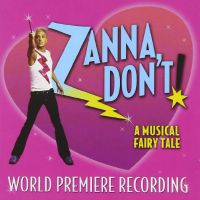 Original Off-Broadway Cast, 2003 (PS Classics)
Original Off-Broadway Cast, 2003 (PS Classics)  (2 / 5) Like the show itself, the cast recording of composer-lyricist Tim Acito’s “musical fairy tale” Zanna, Don’t! will probably appeal mainly to teenagers or early-twentysomethings with limited interest in musical theater. Anyone with more sophisticated taste will find Acito’s work unpolished and sometimes downright sloppy. His music is generally fine, a series of pop-influenced melodies well in keeping with the youthful, bouncy tone that helps sell this musical about a world where homosexuality is the dominant orientation. But Acito’s lyrics may cause fits among purists, because they’re inaccurately stressed throughout and very poorly rhymed, as in: “love/enough,” “lover/another,” “clues/you,” “this/is,” and “town/around” — all of these examples from the first song alone. Lyrical transgressions aside, Acito’s songs make for moderately enjoyable listening, with at least one — a high-school musical spoof about heterosexuals in the military, titled “Don’t Ask, Don’t Tell” — demonstrating a cleverness that’s worthy of notice. Jai Rodriguez gives an endearing performance as the title character, who’s determined to help his classmates find love, but it’s Anika Larsen’s high belting in “I Ain’t Got Time (for Nothin’ But Love)” that brings Zanna, Don’t! as close as it gets to real excitement. — Matthew Murray
(2 / 5) Like the show itself, the cast recording of composer-lyricist Tim Acito’s “musical fairy tale” Zanna, Don’t! will probably appeal mainly to teenagers or early-twentysomethings with limited interest in musical theater. Anyone with more sophisticated taste will find Acito’s work unpolished and sometimes downright sloppy. His music is generally fine, a series of pop-influenced melodies well in keeping with the youthful, bouncy tone that helps sell this musical about a world where homosexuality is the dominant orientation. But Acito’s lyrics may cause fits among purists, because they’re inaccurately stressed throughout and very poorly rhymed, as in: “love/enough,” “lover/another,” “clues/you,” “this/is,” and “town/around” — all of these examples from the first song alone. Lyrical transgressions aside, Acito’s songs make for moderately enjoyable listening, with at least one — a high-school musical spoof about heterosexuals in the military, titled “Don’t Ask, Don’t Tell” — demonstrating a cleverness that’s worthy of notice. Jai Rodriguez gives an endearing performance as the title character, who’s determined to help his classmates find love, but it’s Anika Larsen’s high belting in “I Ain’t Got Time (for Nothin’ But Love)” that brings Zanna, Don’t! as close as it gets to real excitement. — Matthew Murray

